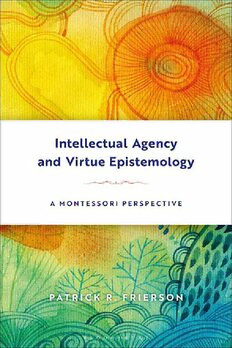Download Intellectual Agency and Virtue Epistemology: A Montessori Perspective PDF Free - Full Version
Download Intellectual Agency and Virtue Epistemology: A Montessori Perspective by Patrick R. Frierson in PDF format completely FREE. No registration required, no payment needed. Get instant access to this valuable resource on PDFdrive.to!
About Intellectual Agency and Virtue Epistemology: A Montessori Perspective
Drawing on the work of Maria Montessori and contemporary virtue epistemologists such as Linda Zagzebski and Jason Baehr, Intellectual Agency and Virtue Epistemology presents a new interpretation of the nature of intellectual agency and its associated virtues.Focusing on Montessori’s interpretation of specific virtues including sensory attentiveness, intellectual love and intellectual humility, it discusses why these are virtues, why one can be held responsible for them, and how they relate to each other. Moreover, it considers pedagogical implications of considering these capacities to be virtues. Intellectual Agency and Virtue Epistemology not only reveals the value of seeing Montessori as a virtue epistemologist, it encourages educationalists to take seriously the cultivation of intellectual virtues as an important part of the education of children.
Detailed Information
| Author: | Patrick R. Frierson |
|---|---|
| Publication Year: | 2020 |
| ISBN: | 9781350018846 |
| Pages: | 273 |
| Language: | English |
| File Size: | 3.425 |
| Format: | |
| Price: | FREE |
Safe & Secure Download - No registration required
Why Choose PDFdrive for Your Free Intellectual Agency and Virtue Epistemology: A Montessori Perspective Download?
- 100% Free: No hidden fees or subscriptions required for one book every day.
- No Registration: Immediate access is available without creating accounts for one book every day.
- Safe and Secure: Clean downloads without malware or viruses
- Multiple Formats: PDF, MOBI, Mpub,... optimized for all devices
- Educational Resource: Supporting knowledge sharing and learning
Frequently Asked Questions
Is it really free to download Intellectual Agency and Virtue Epistemology: A Montessori Perspective PDF?
Yes, on https://PDFdrive.to you can download Intellectual Agency and Virtue Epistemology: A Montessori Perspective by Patrick R. Frierson completely free. We don't require any payment, subscription, or registration to access this PDF file. For 3 books every day.
How can I read Intellectual Agency and Virtue Epistemology: A Montessori Perspective on my mobile device?
After downloading Intellectual Agency and Virtue Epistemology: A Montessori Perspective PDF, you can open it with any PDF reader app on your phone or tablet. We recommend using Adobe Acrobat Reader, Apple Books, or Google Play Books for the best reading experience.
Is this the full version of Intellectual Agency and Virtue Epistemology: A Montessori Perspective?
Yes, this is the complete PDF version of Intellectual Agency and Virtue Epistemology: A Montessori Perspective by Patrick R. Frierson. You will be able to read the entire content as in the printed version without missing any pages.
Is it legal to download Intellectual Agency and Virtue Epistemology: A Montessori Perspective PDF for free?
https://PDFdrive.to provides links to free educational resources available online. We do not store any files on our servers. Please be aware of copyright laws in your country before downloading.
The materials shared are intended for research, educational, and personal use in accordance with fair use principles.

